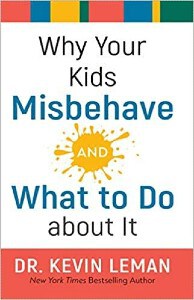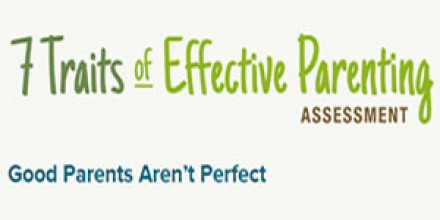
Homemade Meals for Busy Families
Mary Beth Lagerborg, co-creator of Once-A-Month-Cooking, discusses the importance of hospitality and how families can prioritize dinner time by cooking a month’s worth of healthy meals in one session.
Home » Episodes » Focus on the Family Broadcast » Understanding the Root of Your Child’s Misbehavior (Part 2 of 2)
Preview:
Dr. Kevin Leman: When kids fight, they know exactly what to say to escalate the battle and furthermore they know how to engage you in the battle. You need to stay out of that battle, so you don’t react, you respond. And you’re authentic and you learn to say things like, “I’m sure you can handle it.” Turn your back and walk out of the room.
End of Preview
John Fuller: Some sage parenting insights from Dr. Kevin Leman and he’s back again today on Focus on the Family. Stay tuned for more common sense advice as you train your children to become responsible adults. Your host is Focus president and author, Jim Daly. I’m John Fuller. And Jim, once again, we have your wife Jean joining us as well today.
Jim Daly: We do. And it’s always great to have Jean here and, uh, we had a wonderful discussion last time about misbehaving.
John: Mm-hmm.
Jim: Not your misbehavior, John.
John: Yes. (laughing)
Jim: But, you know, as parents with kids what gets them moving in that direction? Well, guess what? It could be you as a parent not handling it appropriately. And if you missed the discussion last time, download it, uh, come to the website, get the app on the smartphone-
John: Mm-hmm.
Jim: … so you can hear it at your convenience. But it was an excellent conversation, I thought very revealing about everybody’s parenting approaches. And we’re going to continue that discussion today.
John: Yeah. We’ve got all the details at focusonthefamily.com/broadcast or call 800, the letter A and the word FAMILY. And Dr. Leman is one of our favorite guests here and one of yours as, uh, listeners. Uh, perennially it seems one of the best of the best broadcasts for us. And he’s a very popular psychologist, TV and media person personality. He’s written over 60 books. I think he’s been here at least 50 times, Jim. (laughing) And, uh, as I said Jean is here. And I, I don’t know how many times you’ve been here, Jean but-
Jean Daly: I don’t know, but it’s-
John: … you’ve been on some best of the best broadcast yourself.
Jean: Well, it’s a pleasure being back.
Jim: Yes, it is. It’s always good to have you. And Kevin good to have you back as well.
Kevin: Well, in my case I think it means (laughing) I’m going to die soon (laughing) because I’ve been here a long time. But you know, we, we’re really getting to the crux of this book in our second broadcast because this book really speaks to why kids misbehave. Well, why do kids misbehave? Number one, they’re attention getters. All kids are attention getters. You know, they come out of the womb. They’re completely dependent upon us. And as they grow into infancy toward that year old, you begin to see this little spirit. You begin to see this little personality develop. I always tell mommies of young kids, “When that child hits 18 months, circle the calendar because you’re going to see a test of will start about 18 months in a child’s life.
Jim: Well, and, and you elaborate on that because you say both good behavior and bad behavior is both a, a yell for attention.
Kevin: Absolutely. So again, I go back to all kids are attention getters. Just follow me for a second. So if the kid gets positive attention for positive behavior, they’re on the right track. As soon as they don’t get positive attention, they still need attention so what kind of attention are they going to get? They’re going to get negative attention. And the kid tells himself, “Well, I’m still getting attention. It’s still working, but that runs its course.” So as the kid gets more discouraged in life, believe it or not, I’m saying a little ankle biter, 18 months to three years old can get discouraged. Life isn’t working out the way they think even at that age. They become powerful.
So why the attention getter says, “I only count in life when I’m noticed. And I put people in my service.” The powerful kid says, “I only count in life when I control, when I win, when I dominate.” So these are the kids who throw temper tantrums. And how we respond to those temper tantrums is really important because that kid throws The temper tantrum for a purpose. Now, purpose is just a word. Purposeful is a psychological word that comes from the psychology of a guy named Alfred Adler. We won’t go into any detail there, but let’s just say that all social behavior serves a purpose in a kid’s life.
So the powerful child is saying, “I am in authority over you parent.” There’s a guy named St. Paul who said something very different. He said, “Children obey your parents. It’s the right thing to do because God has placed them in authority over you.” And I love that translation. That’s a living Bible translation. And that’s what I try to preach to parents, you need to be in authority without being the authoritarian to deal with this powerful child because you need to remove your sales from that child’s wind because if you don’t, and you come on with, “You can. I am your father or I’m…” They’re going to blow you right against the wall.
Jim: Yeah.
Kevin: In a power struggle you lose. So you need a way, to develop ways of circumventing that powerful child where they realize that, “Wait a minute. These powerful ways aren’t working. These parents are a little smarter than what I’m giving them credit for.”
Jim: Well, and that’s the obvious question. Uh, when you have that confrontation what should you do with that three-year-old?
Kevin: Yeah. Well, the kid who’s going to throw the temper tantrum, you simply step over the child walk away. If there’s no audience that kid is not-
Jim: So don’t give them the attention that they’re craving in that way.
Kevin: Right, yeah. If you want to make it full of yourself honey you go ahead. Uh, the point is you’re going to separate the child. You pick up the child, remove him from the scene. That’s the principle I want to teach. And it just says, “Hey, it’s not going to work.”
Jim: Yeah. Kevin, let me, uh, pick up on that because in the book you, you do describe parents’, uh, responsibility to make sure their child is getting enough of your time. That could be so difficult and we can as parents with busy schedules, we can justify all of our busyness. But you’re saying in the book, your child needs you and needs you to spend time with them. So sometimes this misbehavior is rooted just and they’re not getting enough of you.
Kevin: Well, let’s start with this anti-American statement. Activities are not good for your children.
Jim: Now, let me ask, Jean, does that cut against the mom feeling of keeping the kids busy-
Jean: Yes.
Jim: … is a good thing?
Jean: It does.
Kevin: Busy hands are happy hands.
Jim: (laughing) And I mean I can remember-
Kevin: Hey, Leman. It’s better than selling crack cocaine on the street.
Jean: Well-
Kevin: I get it.
Jim: Right?
Jean: Well, and even, you know, I felt when our kids were young I did not want them to spend too much time in sports. And I, I recognized that that wasn’t positive, and, and putting that pressure on them at such a young age. However, as they got older, I wasn’t sure that was the right decision.
Kevin: Well, now we have team soccer. We have city soccer. The whole weekend is geared around the kids’ soccer, or softball, or whatever. I’m telling, it’s crazy. Uh, kids, families don’t go to church on Sunday because they’re off playing in a softball tournament. A- again, it’s all… So much is just directed toward the children, the children of the centerpiece. We bring up kids to feel like they’re the centerpiece of the world. I’ve said it many times and I’ll say it again. If you do that, where is the room for almighty God in a kid’s life?
And I’m here to answer my own question. There’s no room for God in that kid’s life because you got him so busy and you’re so busy. So when we talk about time, where’s the time? The dinner table is a great time to talk.
Jim: Yeah.
Kevin: But other than that… I mean, and I’ve heard on Focus on the Family studies from other authors who said dads will spend 37 seconds a day talking to their kids, things like that. It’s outrageous.
Jim: It is. You’re right.
John: Kevin, back to Jim’s point, I do remember a time when, um, our oldest was I think seven or eight and he just was consistently misbehaving. It was kind of uncharacteristic. And Jim you’ve heard me share this story before. I actually talked to one of our counselors here at Focus on the Family and, uh, we met with, with her and, and she dismissed me and talked to, to our son for a little bit and then brought me back in. And she said, “Well, dad, I think, I think he’s really just wanting you. You’re really, really busy and he’s feeling like he’s not getting you.” So I think there are times, don’t you think? When, when kids do misbehave and it really is just-
Jim: Cry for help.
John: … you know what, I’m just not pouring in like I can.
Kevin: So what’s the purpose of nature of a child eight or nine years old misbehaving? My point would be, well, he’s probably an attention getter. To it, he needs more time with you.
John: Couldn’t verbalize it though.
Kevin: Sometimes kids are revengeful.
John: Mm-hmm.
Kevin: Our prisons are full of people who grew up feeling hurt by life and things happen to those kids should have never happened to a kid. But they did happen. There was no rescue plan. No one came alongside of them. Uh, no one brought them to Christ, you know. They just went off on their own and their whole thing is, is being vengeful toward other people. They’re hateful toward other people. Well, the world they grew up in was hurtful. So if you had a kid grow up in, in fantasy world USA. In a fantasy world, everybody was kind. There wasn’t a thief in town. And, uh, then you brought him to Thiefville where everybody’s a thief.
That kid would be shell-shocked. You know, that kid would run, run back. Now, let’s reverse it. Bring up a kid in Thiefville where everybody’s dishonest and I’ll bring him to fantasy world where everybody is honest. How’s that kid going to behave? If they see a watch in a restroom that was left, what are they going to do with that watch? They’re going to stick in their pocket. Why? ‘Cause that’s what they grew up with.
So the mantra, that imprinting, whatever you want to call it. In this book, I call it the three basic… There’s four. But the fourth one you don’t see very often. So deal with the three, attention getting, power and revenge are mostly the motivation behind the poor behavior, the maladaptive behavior that you see in your home with your children. But you need to understand that message that the kids are feeling like they need more parent. They need more love. They need more acceptance. And that’s, that’s the art of being a parent is making that kid feel special.
John: Mm-hmm.
Jim: No. That’s a good way to look at it and that’s part of what you’ve included in your book there. Kevin, you’re known as the birth order guy and some people may not be familiar with that, believe it or not.
Kevin: Really?
Jim: How, how many millions have you sold (laughing) of that book?
Kevin: Many trees died in its honor. (laughing)
Jim: And, and it’s a great concept. It’s one of those, you know, rare thoughts that you were able to grab and put into a book, The Birth Order Book. But just lightly tell us how that functions and how that helps to shape who we are? I’m sure we’re not locked into that. But you generally learn certain behavior patterns depending upon where you are in the pecking order of your birth, right?
Kevin: Well, firstborns are the movers and shakers in our society. There are leaders, our political leaders. There are senators, our congress people. There are presidents of United States. There are astronauts in the outer space. If there’s something technical, the engineers, the accountants. You’re going to see in inordinate number of firstborn and only born children, they’re sort of psychological cousins to each other. They do very well in life. The child right beneath them is a disadvantage. If that child is a middle child, they’re going to end up a mediator, a negotiator, a compromiser. They’re going to be good at seeing life from both sides of the fence which is pretty good.
I love to tell middle children that they’re peanut butter and jelly sandwich. The babies of the family if you name a comedian right now in all probability you’re talking about a baby of the family. Just name one. They’re, they’re babies across the board. Very few exceptions. All the late night TV guys, I don’t think they’re very funny quite frankly, but they’re all youngest children.
Jim: Why is that? What, what, what action is in play there that makes them predominantly come from-
Kevin: The achiever role was filled by you firstborn children, okay? The next child in line is the opposite of the of that firstborn. So there’s two roles, whatever they are. So that baby, the family is that humor guy, he can’t compete. And that was true of my life. I couldn’t compete (laughing) with my sister and brother, so I became the best of the worst. I graduated fourth of my class in high school from the bottom. (laughing) I mean, I was taking consumers mathematics. That’s bonehead math (laughing) as a senior in high school. I couldn’t get it in college.
I finally did get in college on probation. I mean, most of, you know, my story. I mean, it was terrible. But, you know, along came this woman. When I was 19 years old after I was thrown out of college and she was the one, my future wife who I met in the men’s room of a hospital believe it or not. She was the one that God used to turn my whole life around. And God gave me motivation. And I’m thankful for those years I struggled but, um, we are a product of our environment. And you as a parent, you’ve taken whatever you glean from mom and dad into that role of parenthood. It can work for you but it can also work against you.
Jim: So what do we do, uh, knowing this and its predictability? Because that’s what’s genius about it. It’s, it’s generally true. It may not be absolutely true in every case but I think you’ve done enough research and talked to enough people that you understand it the way you do. But how does a parent help augment that firstborn born child to actually maybe not be as uptight or rules oriented, etc? Is there, do you want to do that or is this just the way God has planned it? And this is why kings and princes tend to be firstborns and leaders as you said. Is it wrong to create a leader out of a last born?
Kevin: Well, I tried and failed to… With my firstborn daughter, I tried not to make her a firstborn. I’m here to tell you I failed. (laughing) Uh, she is a firstborn. She was an English teacher. She knew what a dangling participle was. I mention-
Jim: So high achiever.
Kevin: Oh, yeah, yeah. I mean-
Jim: So do you just roll with it? I mean, is there a reason to, to, to try-
Kevin: You know-
Jim: … to augment that or just let it go?
Kevin: … for all you firstborn and only born children listening to our broadcast today, you know you might have a tad bit of perfectionism in your life. And perfectionism is slow suicide. That’s what you have to understand. And I think the smart parent… When the kids are little and you’re chucking them in and this is the kid who’s got to line up everything. You know, everything has got to be just sort of perfect. Um, kids love stories. Tell them stories. Make up stories. Embellish stories about your life. Share with them about the time you were embarrassed in school, about the time you got picked on, about the time you failed. Whatever it is. Let the kids see the imperfect nature of you.
I spoke in a church just three weeks ago and I gave a talk on the title of my book, The Way of the Wise which is, uh, Proverbs 3:1-6. I gave a very simple altar call about the imperfection of all of us. We had over 100 people respond. I mean, I was sort of shaking my head. I, I was taken back but how many people responded to that. We’re all imperfect.
Jean: That’s right.
Kevin: We need each other. Kids need to understand that we have their back. We love them with all their flaws. To our school teachers that I have some influence over, and we’re talking about a fourth grade spelling test, why would you write minus four at the top of that? What’s wrong with plus 96?
Jean: Yes.
Kevin: What’s wrong with looking for the positive ways of expressing, “Hey, good job.” Good job is what I think I call vitamin E. It’s encouragement. Not, we not praise. Praise God. All others pay cash as someone once said. God is worthy of our praise, your kid isn’t. But your kid needs encouragement. Encouragement says, “I got your back. I see how you’re doing life. I’m proud to be your parent. You’re doing good. And if you get stuck, I’m here to help you.” If that message comes across to your son or daughter, they’re going to go out in life and they’re going to be a winner.
Jim: And those are heartfelt good things about parenting. And, and seeing your kids do the beautiful things and you go, “Great. Okay, they caught that lesson.” And I think that happens as your chi- your children get older. You see more of that. Hopefully, that’s the goal. In the book you described discipline 101 and in there you, you said, “Discipline goes hand in hand with misbehavior. So what’s the difference between discipline and punishment?”
John: Mm-hmm.
Kevin: Well, see and this is sort of framed in our society today because if you just come across as I’m punishing you, let me tell you how a kid thinks today. They don’t think of us on a different plane. They see themselves as social equals so in their head, “Okay, if you’re right to punish me, I have a right to punish you back.” And discipline, I think takes on a little different color that we acknowledge that mistakes were made. We turn things into teachable moments. I love to tell a story about our high school invited me to be on their wall of fame and, and I jumped at the opportunity to do it because I was such a little cut up in high school.
But on the way up, I was talking to my mother who was 90 years old at the time and I said, “Mom, we fooled a few people.” “Oh, honey, I’m so proud of you.” And I reminded her about time the police brought me home. I’ll never forget what she said. She said, “Oh, I do remember that but you are such a good boy.” (laughing) So somehow we still have to come across with the fact that, “You know, we love you anyway and we accept you flaws and all.” So discipline is, hey, you take the kid behind the closed door and you have a little talk, and you give them the look. And they get the message of what happened at dinner or what happened at school was not cool at all. And my expectation for you is that we see it change in your behavior.
Jim: Mm-hmm.
Kevin: It’s a teachable moment. And you ask the kid, “What are you going to do to change that?” We talked about rules afterward. All the Leman children wrote rules governing the use of the family car. I didn’t give them the rules. They wrote the rules. I didn’t ask them to write the rules. How did that happen? They must have assumed that they realized it was a privilege to have that key to that car. You give a key to a car to a kid that’s not responsible, that’s on you. You’re a dummy parent. Don’t do that. Have expectations for your kids that are reasonable.
Jim: Yeah
Kevin: Not unreasonable.
Jim: And what I continually hear from you, Kevin, is put that on your child to give you the boundaries. I mean, pretty consistent with that.
Kevin: Mm-hmm.
Jim: I like that idea although it’s a nail-biter for some parents.
Jean: Oh, yes.
John: Especially firstborn parents. (laughing)
Jean: Yes. But it, but it helps reinforce the goal, are you raising a child or are you trying to raise an adult?
Kevin: Again, that’s a gold star observation.
Jim: Kevin, let me ask you this.
Kevin: Yeah.
Jim: Uh, parents we can emotionally overreact, obviously.
John: Mm-hmm.
Jim: And I think it’s really critical as we wind down the time we’re going to take some questions in a minute but, uh, one of the things that we trip on as parents is that we can get sucked into the emotional argument and we end up… I mean, I did this with the boys when they were younger. I mean, I’d be right down at their level. Emotionally I’m going, “Oh my goodness, who’s the adult in the room.” (laughing)
Kevin: Yeah.
Jim: You know, I, I the question I have for you is just how do we as the parent remember we’re the parent-
John: Mm-hmm.
Jim: And don’t be, you know, tricked getting into that game with your kid?
John: Don’t take the bait.
Jim: Don’t take the bait.
Kevin: Don’t take the bait. Well, remember fighting is an act of cooperation. When you fight with your husband or your wife, you know, exactly what to say to escalate the battle. Okay? Same thing is true of kids. When kids fight, they know exactly what to say to escalate the battle. And furthermore, they know how to engage you in the battle. You need to stay out of that battle, so you don’t react, you respond. And, and you’re authentic and you learn to say things like, “I’m sure you can handle it.” Turn your back and walk out the room.
If you see blood 20 minutes later, I’d get involved. (laughing) But let the kids have a track record so to speak in their own home that they’re going to solve their own problems. And so I would say don’t panic, don’t overreact.
John: Mm-hmm.
Kevin: Be a listener and listen again. If you can listen without judgment, if you remember this, judgments will separate you from your child. Judgments will separate you from your husband or your wife.
Jim: What’s a judgment sound like?
Kevin: You’re wrong, being prescriptive.
Jim: Yeah.
Kevin: You know, where-
John: You should have done, that kind of thing.
Kevin: Yeah, yeah. Any, anything along that line. So if you learn to listen without judgment, okay, just hear them out. Lots of times the situation will calm down by itself. So we make things worse. It’s like we throw kerosene on the fire. It just flames up.
John: Yeah.
Kevin: But just remember fighting is an act of cooperation. And some people are listening right now saying, “Boy, my kids sure cooperate.”(laughing) ‘Cause they fight over everything.
Jim: Right.
Kevin: Well, if you have trouble getting a kid out the door to school, and maybe you’re in a carpool. In fact, I have that example in this book. You want that to change? I can tell you how to change. It’ll change in one day. Leave your 11-year-old home. Don’t call them. Don’t get them up in the morning. Take the other kids to school. He’ll be waiting there in the car port. He’ll be out in front of the house. He’ll be mad. He’ll be angry. He’s late for school. “Honey, we’ve had this talk so many times. I’m not your alarm clock anymore. From now on, you’re either up. You’re on the train or you’re not. And I’m not real happy because now I have to drive you back to school.” But be smart. Send an email or call the principal, have them call that kid in and talk with them about being late.
It works beautifully. Action, not words. You’ve already used words. You use them every day over and over and over again. It hasn’t got you the results. You want the kid to be up in the morning and on the school bus? Use action not words. That’s why the little Why Kids Misbehave is such a good practical book ’cause the back part of it is what to do about it and those are some of the things you do about it.
Jim: Yeah. And you have a whole host of time tested strategies in there, Kevin. It’s a great resource. But let’s open it up now. Let’s have a couple of questions from our guests here today and, and see if they can stump the expert. (laughing)
Evan: “Hi, Dr. Leman. My name is Evan. Uh, you talked about the importance of training children and like with a puppy starting when they’re young. For those of us who may not have done well at that, when they’re young, uh, is there hope for us? And how might we say with elementary school children, um, start to be more intentional about that training, uh, without causing a shock to the family?
Kevin: Well, I love your question Evan. But, you know, I think one of the real joys of parenting sometimes is blind siding those little suckers. (laughing)
Jim: A spiritual truth, right?
Kevin: It really gets their attention. And see, you have the heart of a parent. You’re saying, “Hey, Leman. Okay I’m with you. I understand, you know, maybe you got a kid still sleeping in your bed for example.” And Dr. Leman says, “Don’t start habits. You don’t want to have continue forever, so get that little sucker out of bed.” And you’re saying, “Well, I’m looking at my life and, you know, there’s some things that we need to change, but how can I change them without being injurious to little Buford?” (laughing) And I’m saying, “No, Evan. Let’s try it a different way. Let’s blind side that little sucker, Evan.” (laughing) And really get his attention and then say, “You know, something? Mommy and daddy have done some real heart-searching and we think that things have to change here in the family. And you’re going to see some changes in us that you’re probably not going to like because we’re all creatures of habit. We’ve all learned to do things a certain way but there’s some things happening soon. You’re going to see that and you’re going to have to deal with it as best you can.”
Jim: It’s good.
Kevin: Now, I prefer that over trying to make this a soft easy transformation into a new world for that son or daughter.
John: Some challenging ideas for your family from our guest, Dr. Kevin Leman. This is Focus on the Family with Jim Daly. I’m John Fuller and we also enjoyed having Jean Daly join us for the conversation as well.
Jim: So true. And, uh, there may be some moms and dads listening right now who have a slightly different approach than Kevin’s method of parenting and that’s all right. Uh, you know, embrace the challenge. How to do this best is really the goal for everybody. Uh, the goal here isn’t to tell you exactly what to do in every situation, uh, you know, your children better than anyone and we recommend you determine what will work best in your family. What we’ve tried to do today and last time is simply give you some tools and insights for understanding why your children behave the way they do. And I believe Kevin has helped all of us take, take a step in the right direction with this wonderful resource, Why Your Kids Misbehave–and What to Do about It.
When you make a monthly pledge to Focus on the Family, we’ll get a copy of Kevin’s book right out to you. Monthly giving provides the fuel we need to respond to more than a half a million families who contact us every year looking for help on everything from adjusting to a new baby to launching a teenager into adulthood. We invite you to join our family strengthening team today. Make a monthly pledge or send a one-time gift, whatever you can afford and let me say thank you in advance on behalf of all those families you’re going to help.
John: Mm-hmm. Our number is 800, the letter A and the word FAMILY. That’s 800-232-6459. Or you can donate and request Kevin’s book at focusonthefamily.com/broadcast. And another way we can help you is with our free online assessment called Seven Traits of Effective Parenting. This will take about 10 minutes of your time or so. It’s very easy to fill out and it will offer you a quick overview of what’s working well in your family and maybe an improvement point or two. Uh, take that Seven Traits of Effective Parenting assessment. The details are on our website. Thanks for listening to Focus on the Family with Jim Daly. I’m John Fuller inviting you back next time as we once again help you and your family thrive in Christ.

Dr. Kevin Leman is an internationally known family psychologist and an award-winning, New York Times best-selling author. He is also a popular public speaker and media personality who has made countless guest appearances on numerous radio and TV programs. Dr. Leman has written more than 50 books including The Birth Order Book, Have a New Kid by Friday and Making Children Mind Without Losing Yours. He and his wife, Sande, reside in Tucson, Ariz., and have five children and several grandchildren. Learn more about Dr. Leman by visiting his website birthorderguy.com.

Receive the book Why Your Kids Misbehave, and What To Do About It for your donation of any amount! Plus, receive member-exclusive benefits when you make a recurring gift today. Your monthly support helps families thrive.

Focus on the Family’s age and stage emails help you think through an aspect of parenting so you can think (and not react) in the moment. When you sign up you’ll receive weekly emails based on your child’s age and stage with relevant insights that grow with your child and have long-lasting influence. You’ll also receive an annual email during your child's birth month with downloadable content to help you guide your child toward a thriving life in Christ. Everything you receive will be biblical, practical, and personal. We promise. Sign-up today!

There's no parenting formula to follow, but there are ways you can grow every day. This assessment gives parents an honest look at their unique strengths, plus some areas that could use a little help.

Visit our online store and purchase a CD of today's program for yourself or to share with a friend.

Here’s a game plan to trump your child’s misbehavior.

No more ranting, raving, blaming, pleading, begging or threatening.

Psychologist and best-selling author Dr. Kevin Leman explains how you can avoid common parenting mistakes and implement "reality discipline," in which real-life consequences teach children rather than you lecturing, reminding or rescuing them.

Psychologist and best-selling author Dr. Kevin Leman explains how you can avoid common parenting mistakes and implement "reality discipline," in which real-life consequences teach children rather than you lecturing, reminding or rescuing them.

Mary Beth Lagerborg, co-creator of Once-A-Month-Cooking, discusses the importance of hospitality and how families can prioritize dinner time by cooking a month’s worth of healthy meals in one session.

Scott Klusendorf, President of The Life Training Institute and Robyn Chambers, Vice President of Advocacy for Children at Focus on the Family, share strategies and encouragement in the pro-life movement. They offer compassion for abortion-minded women and speak up for pre-born babies. (Part 2 of 2)

Scott Klusendorf, President of The Life Training Institute and Robyn Chambers, Vice President of Advocacy for Children at Focus on the Family, share strategies and encouragement in the pro-life movement. They offer compassion for abortion-minded women and speak up for pre-born babies. (Part 1 of 2)

Larnelle Harris shares stories about how God redeemed the dysfunctional past of his parents, the many African-American teachers who sacrificed their time and energy to give young men like himself a better future, and how his faithfulness to godly principles gave him greater opportunities and career success than anything else.

Amy Carroll shares how her perfectionism led to her being discontent in her marriage for over a decade, how she learned to find value in who Christ is, not in what she does, and practical ways everyone can accept the messiness of marriage and of life.

Jonathan McKee offers parents practical advice and encouragement in a discussion based on his book If I Had a Parenting Do Over: 7 Vital Changes I’d Make.